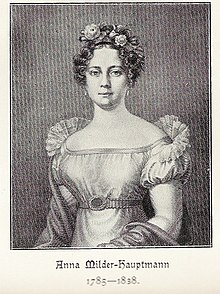"The Shepherd on the Rock" (German: Der Hirt auf dem Felsen), D. 965, is a Lied for soprano, clarinet, and piano by Franz Schubert. It was composed in 1828 during the final months of his life.


Lyrics
editOf the seven verses, the first four and the last came from the poetry of Wilhelm Müller, while verses five and six were attributed to Helmina von Chézy[1] but were written by Karl August Varnhagen von Ense.[2][3]
Background
editThe Lied, Schubert's penultimate composition, was written as a belated response to a request from the operatic soprano Anna Milder-Hauptmann, a friend of Schubert. She had requested a show-piece that would allow her to express a wide range of feelings, and he wrote it as thanks for her attempts to stage one of his operas in Berlin.[1] She received a copy of the score from Schubert's brother Ferdinand in September 1829,[4] and the work was published a year and a half after Schubert's death. Milder sang it for the first time at the House of the Blackheads in Riga on 10 February 1830.[5]
Structure
editThe Lied has three sections, with clarinet and voice equally challenged. The first, in B-flat major, is warm, as the lonely shepherd on the mountaintop listens to echoes rising from below. The second section grows dark as he expresses grief and loneliness; it starts in G minor, then modulates through A-flat major and A minor to G major. The short last section, returning to B-flat major, anticipates the coming of spring and, with it, rebirth.
Complete text
edit| Wilhelm Müller – "Der Berghirt" (The Mountain Shepherd) | |
|---|---|
Wenn auf dem höchsten Fels ich steh', |
When, from the highest rock up here, |
| Varnhagen – "Nächtlicher Schall" (Nightly Sound) | |
In tiefem Gram verzehr ich mich, |
I am consumed in misery, |
| Wilhelm Müller – "Liebesgedanken" (Love Thoughts) | |
Der Frühling will kommen, |
The Springtime will come, |
References
edit- ^ a b Schwarm, Betsy (September 9, 2013). "Der Hirt auf dem Felsen". Encyclopædia Britannica. Retrieved 28 August 2020.
- ^ T. G. Waidelich: "Der letzte Hauch im Lied entflieht, im Lied das Herz entweicht! – Varnhagens 'Nächtlicher Schall' als letzter Baustein zum 'Hirt auf dem Felsen'." In: Schubert: Perspektiven 8 (2010), p. 237–243.
- ^ a b Varnhagen von Ense, Karl August (1816). Vermischte Gedichte (in German). Frankfurt: Barrentrapp. p. 15. Verses 2 and 1 used by Schubert.
- ^ Keller, James M. (November 2018). "Notes on the Program" (PDF). nyphil.org. New York Philharmonic. Retrieved 28 August 2020.
- ^ "Anna Milder-Hauptmann and 'Der Hirt auf dem Felsen' ". In: Schubert 200, Edited by Ilija Dürhammer, Edition Braus, Heidelberg 1997, ISBN 9783894661939 pp. 165–167.
- ^ Müller, Wilhelm (1824). Sieben und siebzig Gedichte aus den hinterlassenen Papieren eines reisenden Waldhornisten. Lieder des Lebens und der Liebe, vol. 2 (in German). Dessau: Ackermann. pp. 111–112.
- ^ Müller 1824, p. 122, verse 2
Further reading
edit- C. Ahrens: "Schuberts 'Der Hirt auf dem Felsen' D. 965 – Lied, Arie oder 'Duett'?" In: Schubert: Perspektiven 5 (2005), pp. 162–182.
- Johnson, Graham (1990). "Der Hirt auf dem Felsen, D965 (program note)". Hyperion Records.
- Mayer, Andreas [in German] (1995). "'Gluck'sches Gestöhn' and 'welsches Larifari': Anna Milder, Franz Schubert und der deutsch-italienische Opernkrieg". Archiv für Musikwissenschaft (in German). 52 (3): 171–204. doi:10.2307/930894. JSTOR 930894.
- Meyer, Andrew D. (4 June 2022). "Der Hirt auf dem Felsen D. 965 Op. 129 Analysis".
External links
edit- "Der Hirt auf dem Felsen": Scores at the International Music Score Library Project
- First part of the German lyrics, with translations, lieder.net
- Third part of the German lyrics, with translations, lieder.net
- Complete text, with English translation, beverlysillsonline.com
- Review of recording by Helen Donath, Dieter Klöcker, Klaus Donath; Arts Archives 43054-2 (1981)
- Performance of "Der Hirt auf dem Felsen" on modern instruments by Hyunah Yu (soprano), Alexander Fiterstein (clarinet), and Gilbert Kalish (piano), from the Isabella Stewart Gardner Museum in MP3 format